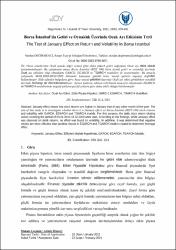Borsa İstanbul’da getiri ve oynaklık üzerinde ocak ayı etkisinin testi
Citation
Degirmenci, N. (2021). Borsa İstanbul’da Getiri ve Oynaklık Üzerinde Ocak Ayı Etkisinin Testi. Journal of Yasar University, 16(62), 478-491. https://doi.org/10.19168/jyasar.857501Abstract
Hisse senetlerinin Ocak ayında diğer aylara göre daha yüksek getiri sağlaması Ocak ayı etkisi olarak
tanımlanmaktadır. Bu çalışmanın amacı Borsa İstanbul (BIST 100) hisse senedi getiri ve oynaklığı üzerinde
Ocak ayı etkisinin olup olmadığını GARCH, EGARCH ve TGARCH modelleri ile araştırmaktır. Bu amaçla
çalışmada 04.01.2010-18.02.2020 dönemini kapsayan günlük hisse senedi getirisi kapanış değerleri
kullanılmıştır. Elde edinilen bulgulara göre, hisse senedi getirileri üzerinde Ocak ayı etkisi görülürken oynaklık
üzerinde herhangi bir etki bulunamamıştır. Ayrıca kaldıraç etkisini belirlemek amacıyla oluşturulan EGARCH
ve TGARCH modellerinde negatif şokların pozitif şoklara göre daha etkili olduğu belirlenmiştir. January effect means that stock returns are higher in January than in any other month of the year. The
aim of this study is to investigate whether there is a January effect on Borsa İstanbul (BIST 100) stock returns
and volatility with GARCH, EGARCH and TGARCH models. For this purpose, the daily stock return closing
values covering the period of 04.01.2010-18.02.2020 were used. According to the findings, while January effect
was observed on stock returns, no effect was found on volatility. In addition, it was determined that negative
shocks are more effective than positive shocks in EGARCH and TGARCH models created to determine leverage
effect.


















